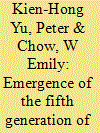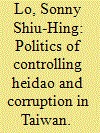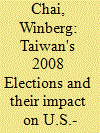| Srl | Item |
| 1 |
ID:
083257


|
|
|
|
|
| Publication |
2008.
|
| Summary/Abstract |
The Hu Jintao regime is likely to remain in power until the Eighteenth National Congress of the Communist Party of China (CPC) in late 2012. It must, however, pick or groom a suitable elite and leaders to succeed Hu. The successors need to learn to navigate within the safe zones of a series of dialectical models to maintain the mainstream market-economy line of the CPC leadership within the context of Chinese Communism.
|
|
|
|
|
|
|
|
|
|
|
|
|
|
|
|
| 2 |
ID:
083255


|
|
|
|
|
| Publication |
2008.
|
| Summary/Abstract |
The author examines the relationship between the Taiwanese government and organized crime. He argues that the government is relatively weak vis-à-vis organized crime, which has traditionally infiltrated the political system through elections and bureaucratic corruption. The weak anticrime apparatus and civil servants' and politicians' lack of ethical behavior provide fertile ground for political corruption to persist. Clean government's defenders include most prosecutors, court judges, media professionals, and social activists. But civil servants need to be educated on the values of public accountability, financial propriety, and personal ethics. Anticorruption bodies should be reformed, and a single authority should be vested with the necessary legal authority to curb graft in the private and public sectors. To improve its democratic image, Taiwan must consolidate its governmental capacity to control domestic crime and destroy the coalition between the heidao, money politics, and bureaucratic corruption.
|
|
|
|
|
|
|
|
|
|
|
|
|
|
|
|
| 3 |
ID:
083256


|
|
|
|
|
| Publication |
2008.
|
| Summary/Abstract |
Outgoing Taiwanese President Chen Shui-bian's Democratic Progressive Party (DPP) was defeated in the historic 2008 presidential and legislative elections, and voters returned the reins of government to the long-ruling Nationalist Party (KMT). The author analyzes the KMT's return to power after eight years of DPP rule, its significance, and its potential to create new stability in East Asia and better cooperation between the United States and Taiwan. The author also examines the reasons for the DPP's resounding defeat, including its traditional oppositional role in Taiwanese politics and its failure to deliver on its promises to reduce corruption and maintain economic well-being. The author further analyzes the DPP policies' disastrous impact on Taiwan's domestic scene and its regional alliances. The author concludes with a prediction of what the KMT's return will mean for U.S.-China-Taiwanese relations.
|
|
|
|
|
|
|
|
|
|
|
|
|
|
|
|